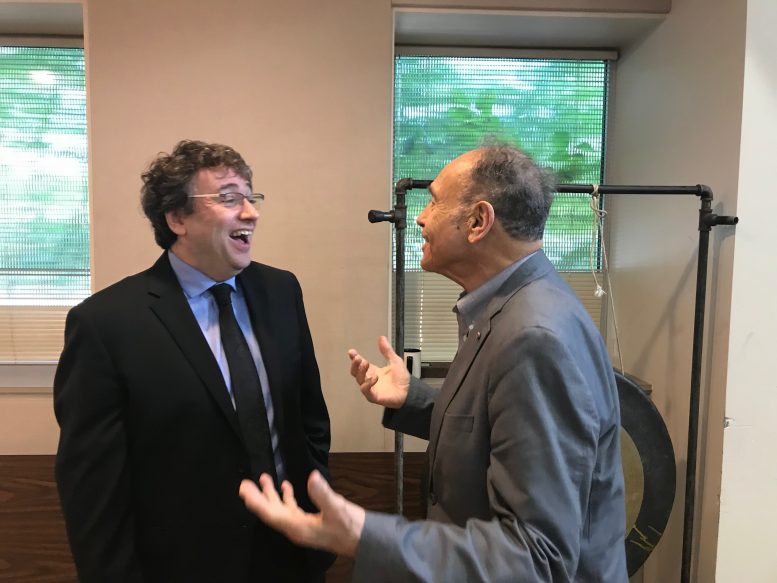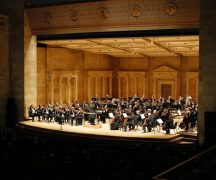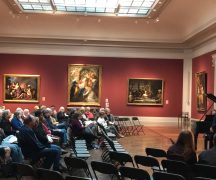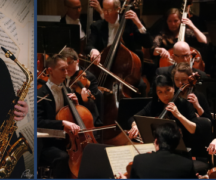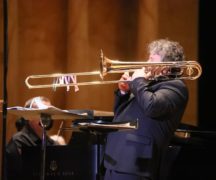By DAVID DUPONT
BG Independent News
Alain Trudel came to Toledo to conduct an orchestra, and to become part of a community.
The Montreal native, who in September began his tenure as Toledo Symphony Orchestra music director, said that he knew this was a place he wanted to be when he saw a poster in the orchestra’s office that spoke to its mission. It addressed, he said, the pillars that he also believes are essential.
The first is artistic excellence — “to try to play the best version you can at any given time.”
That’s essential, but not to his mind sufficient.
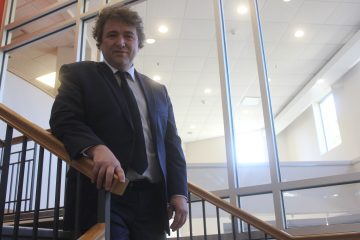
Alain Trudel at the offices of the Toledo Symphony Orchestra
Just as important, Trudel said, is being connected to the community. “Do you teach? Do you have a youth orchestra? Do you play chamber music in different houses?” And he was pleased to find “the orchestra does that.”
That shows the organization “understands what it means to be relevant in your own community,” Trudel said. “If you are not relevant in your own community, you are in mortal danger.”
The education part is the third pillar. The orchestra should be passing along the love of music to a young generation.
Trudel has already attended and conducted a couple Toledo Symphony Youth Orchestra rehearsals. He thinks of the members of those ensembles as his “younger colleagues.”
Trudel will conduct his third concert as music director Saturday, Oct. 20, at 8 p.m. in the Toledo Museum of Art Peristyle. The concert includes classics of the symphonic repertoire by Rimsky-Korsakov, Borodin, and Stravinsky and a world premiere of a tuba concerto by Samuel Adler. Adler, a Perrysburg resident, is world renowned as a composer and educator. But he’s part of the regional music family, the conductor said.
The solo part will be performed by the symphony’s tubist David Saltzman, who teaches at Bowling Green State University.
During Stravinsky’s “Firebird Suite,” artist Holly Carr will be on stage creating a panoramic silk painting.
Trudel’s debut concert on the Classics series gave a clear indication of his direction.
He opened with Beethoven’s Fifth Symphony that spotlighted the orchestra. Then the symphony played a composition by Christopher Dietz, of the BGSU faculty. The concert closed with dancers from the Toledo Ballet performing excerpts from “Swan Lake.” This was arranged, Trudel said, before the merger of the ballet and the orchestra was even being considered.
“I didn’t want it to be all about me,” he said of the program. “I didn’t want it to be all about the orchestra. I wanted it to be about connecting.”
For Trudel that includes conducting at least one concert on all the symphony’s series, be it Pops, Family, or the Neighborhood concerts in venues throughout the region.
“The public doesn’t migrate,” Trudel said. Those who go to hear the orchestra play the “West Side Story” soundtrack live will not for the most part come to hear Mahler. “If you don’t show your face in each of the music series, you’re actually cutting yourself off from part of the audience.”
Conducting a range of concerts is not a problem for him, he said. “My tastes are very eclectic. That gives me joy in all the series.”
On March 9 when pianist Gene DiNovi joins the orchestra for music from the golden era of jazz, Trudel will be on stage with his trombone.
Trudel, 52, started playing the horn when he was 12.
The son of a jazz drummer and a cabaret singer, he’d had no musical training before then. His parents’ musical careers were over by the time he was born. The Montreal clubs they performed in had transformed into strip clubs and discos.
“Music for them meant love, but it also meant heartbreak,” Trudel said. He grew up with his mother, seeing his father only occasionally.
At the start, Trudel just wanted to hang out with his friends, so he joined a brass band run by adults in his Montreal neighborhood. He wanted to play drums like his father. But those spots were taken, as were all the trumpet spots. So he was given a valve trombone.
He was 16th of 16 trombonists in the band that played tunes such as “How Deep Is Your Love” by the Bee Gees. “I liked music, but I didn’t know if it liked me,” Trudel said. But he practiced, and in a couple years he was the first trombonist.
Now he loved music and was thinking about it as a career. “My mother cried. She didn’t want me to go into music. ‘You’ll get your heart broken.’”
His high school was shuttered because, he said, it was too rough. He went to a school that focused on music. He played in the orchestra. “I didn’t have an instrument. We were very poor. We had money to eat and pay rent.” He took a newspaper route for two years to earn enough money to buy a slide trombone.
Trudel wanted to take music lessons at the conservatoire, which would be free if he was accepted. When he auditioned, he didn’t know a lick of classical music. He played the jazz standard “Misty.”
And he played a four-octave scale. The officials at conservatoire knew they had something they could work with.
He started collecting used records — Shostakovich, Bartok, and Tchaikovsky — and he started reading the scores to the music. He wanted to compose, but when his high school orchestra director Raymond Grignet asked him about it, he was too shy to admit to his aspirations.
Grignet asked if he wanted to conduct. So now Trudel had what every aspiring conductor desires — podium time.
He proved to be a prodigy as a trombonist, and as a 17-year-old was the runner up in the auditions for the principal trombone chair in the Orchestre Symphonique de Montreal. The orchestra, conducted by Charles Dutoit, used him every couple weeks as a substitute.
He eventually left to join the Barcelona Orchestra as principal trombonist, and started to present recitals leading to a number of recordings.
Throughout this time he continued to conduct and in 2004 became conductor of the Toronto Symphony Youth Orchestra — “the TSYO, just like here!” He also conducted tours of the National Youth Orchestra.
When he was 39, he was diagnosed with a rare cancer of the stomach lining. He had to be operated on, which he described as “old fashioned Medieval butchery. … They open you up and empty you like a fish.” He was on the operating table for 12 hours as the surgeons cut out and burned cancerous tissues.
Now he is at the point where the chance of the cancer returning is very low. Trudel thought he’d have to give up playing, but after two years realized he had to take up his horn again. He missed playing too much.
This year Trudel is especially looking forward to the performance of the Mahler’s “Resurrection” in May. The chorus will be made up of singers from chorales from around the area.
Trudel said he plans to rehearse the chorale regularly leading up to the concert. This is a way of creating a larger musical family.
“In the future,” he said, “I really want is to deepen the collaborations. The goal is to share music with the community at large.” The orchestra “has already done so many great things,” he said. “What made this match work is we really have the same goals. That makes for a long-term relationship.”

